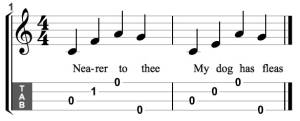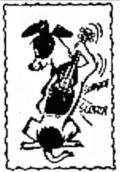My Dog Has Fleas
Since the triumphant reception of the ukulele in the USA in 1915, this has been a widely used mnemonic for the most common tuning of the ukulele in GCEA (C6).
| Word | My | Dog | Has | Fleas |
|---|---|---|---|---|
| string | G | C | E | A |
This mnemonic has even found its way into the literature of memory psychology:
In tuning the ukulele, this catch phrase can be sung:
„My dog has fleas —“1)
Origin
The exact origin of this mnemonic is unknown. The words themselves do not match the names of the strings. However, I suspect that it is a parody of a well-known 19th century English hymn, Nearer, My God, to Thee.
It was reported as early as the late 19th century that church scoffers in the U.S. parodied this song to „Nero, my dog has fleas.“4) This parody was very popular among students in the following years; this was the demographic group that came into contact with the ukulele most intensively.
The first verse of Nearer, My God, to Thee begins:
| 1st bar | 2nd bar | ||||||||
|---|---|---|---|---|---|---|---|---|---|
| Nea- | rer, | my | God, | to | thee, | Nea- | rer | to | thee! |
| A | G | F | F | D | D | C | F | A | G |
The second bar is CFAG, which is almost identical to GCEA if you move the reentrant G to the end and swap the F for the E, which is down a semitone. So it was probably originally sung and played as CEA (up the scale) and then G (down the scale).
Since the word ukulele is probably derived from 'uku „flea“ and lele „jumping“, the association with fleas-ridden dogs is easily explained. In any case, there are already numerous references to the connection between dogs and ukuleles in the press as early as the 1920s.
Distribution
Everyday ---
Donald Jones in The Franklin Evening Star 18.10.1938, p. 2
Honolulu
"Flea" String
Niagara Falls, N.Y., May 18 (AP) — A music store owner told this story.
A small boy walked into his shop and said:
„I want to buy a flea string for my ukulele.“
When the proprietor suggested he meant a „D“ string, the boy replied:
„No, I don't. When my teacher tunes my ukulele, he sings 'My-dog-has-fleas' and it's the flea string that broke.“
Say My Dog Has Fleas When You Tune an Ukulele
On July 17, 1939, George Cruesling and Claude Malani filed their copyright to the following song:
David Rose: My Dog Has Fleas
Holiday for Music
Written in a comic vein, „My Dog Has Fleas“ will be the David Rose5) original musical piece on the „Holiday for Music“ program, Wednesday, at 10:30 p.m., EST, over CBS. Fantasy woven on the four notes that ukelele players warble as they tune up, „My dog has fleas“ is another of the rhythmic novelties for which the young composer-conductor is noted.
Hot Footlight Notes From Hotfooting Footrails
Some time ago Rose took an old ukulele effect known widely as „My Dog Has Fleas“ when that tiny stringed instrument was a staple on porches and beaches, and arranged the four notes into a complete composition. The notes are simply the tune plucked out by the four ukulele strings without fingering. Rose orchestrated them first in a pizzicato effect, then as a soft and sweeping passage using a large violin choir and brasses, proceeding to other quasi-concert results which are excellent musically and amusing in their sharp evasion of stuffy tradition.
Jack O'Brian, in: The Morning Herald (Union Town, Pennsylvania)  31.8.1946, p. 4
31.8.1946, p. 4
Victor Young (1900–1956) and his orchestra recorded a recording of „My Dog Has Fleas“. It actually starts with the leitmotif GCEA.6)
Of course, after the Second World War, the origin of this custom – the song parody – seems to have been forgotten, so that it was only associated with the ukulele itself.
In the episode The Ukulele of The Phil Harris-Alice Fay show, which aired on 30.10.1949 on the radio, Phil Harris presents himself as a ukulele player. A friend visits him and tries to Harris' ukulele My dog has fleas to intone. Harris comments on the weird singing:
Your voice is kind of lousy, too.
Variants
Good Children Eat Apples
As another English mnemonic, Good Children Eat Apples is common.
Japanese Variants: Hanako-san
In Japan, the female personal name Hanako-san 花子さん is used as mnemonic. Allegedly, the comedian Maki Shinji called this while tuning his ukulele and made it popular.
 | (Illustration: Ukulele Lesson) |
German Variants: Gib Carl einen Apfel
I recommend Gib Carl einen Apfel as a German mnemonic.




